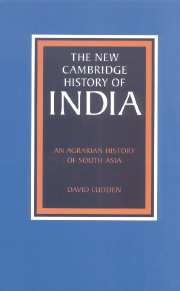Bibliographical essay
Published online by Cambridge University Press: 28 March 2008
Summary
Because there are too many relevant titles, I limit citations to monographs and anthologies, as much as possible, and cite later work that supersedes earlier scholarship. I omit some citations which have appeared previously in the footnotes. The lists of titles are alphabetical by authors, and each author’s titles are listed chronologically. A fuller bibliography, which I will update and expand, appears on my homepage: http://www.sas.upenn.edu/~dludden/.
Intellectual history
Agriculture became an official topic for scholarly analysis under Company Raj. The most useful monographs on agrarian ideas in the Company period are S. Ambirajan, Classical Political Economy and British Policy in India (Cambridge, 1968), Ranajit Guha, A Rule of Property for Bengal (Paris, 1963), Burton Stein, Thomas Munro: The Origins of the Colonial State and His Vision of Empire (Delhi, 1989), and Eric Stokes, The English Utilitarians and India (Oxford, 1959). For the later Raj, see B. R. Tomlinson, The Political Economy of the Raj, 1914±1947: The Economics of Decolonization (New York, 1979) and Bipan Chandra, The Rise and Growth of Economic Nationalism in India: Economic Policies of the Indian National Leadership, 1880-1905 (New Delhi, 1966), which is supplemented by Bipan Chandra’s editing of M. G. Ranade, Ranade’s Economic Writings (New Delhi, 1990). For post-1950s of®cial thought, see A. M. Zaidi and S. G. Zaidi, The Foundations of Indian Economic Planning (New Delhi, 1979) and A. Moin Zaidi, ed., A Tryst with Destiny: A Study of Economic Policy Resolutions of the INC Passed During the Last 100 Years (New Delhi, 1985).
- Type
- Chapter
- Information
- An Agrarian History of South Asia , pp. 231 - 248Publisher: Cambridge University PressPrint publication year: 1999

